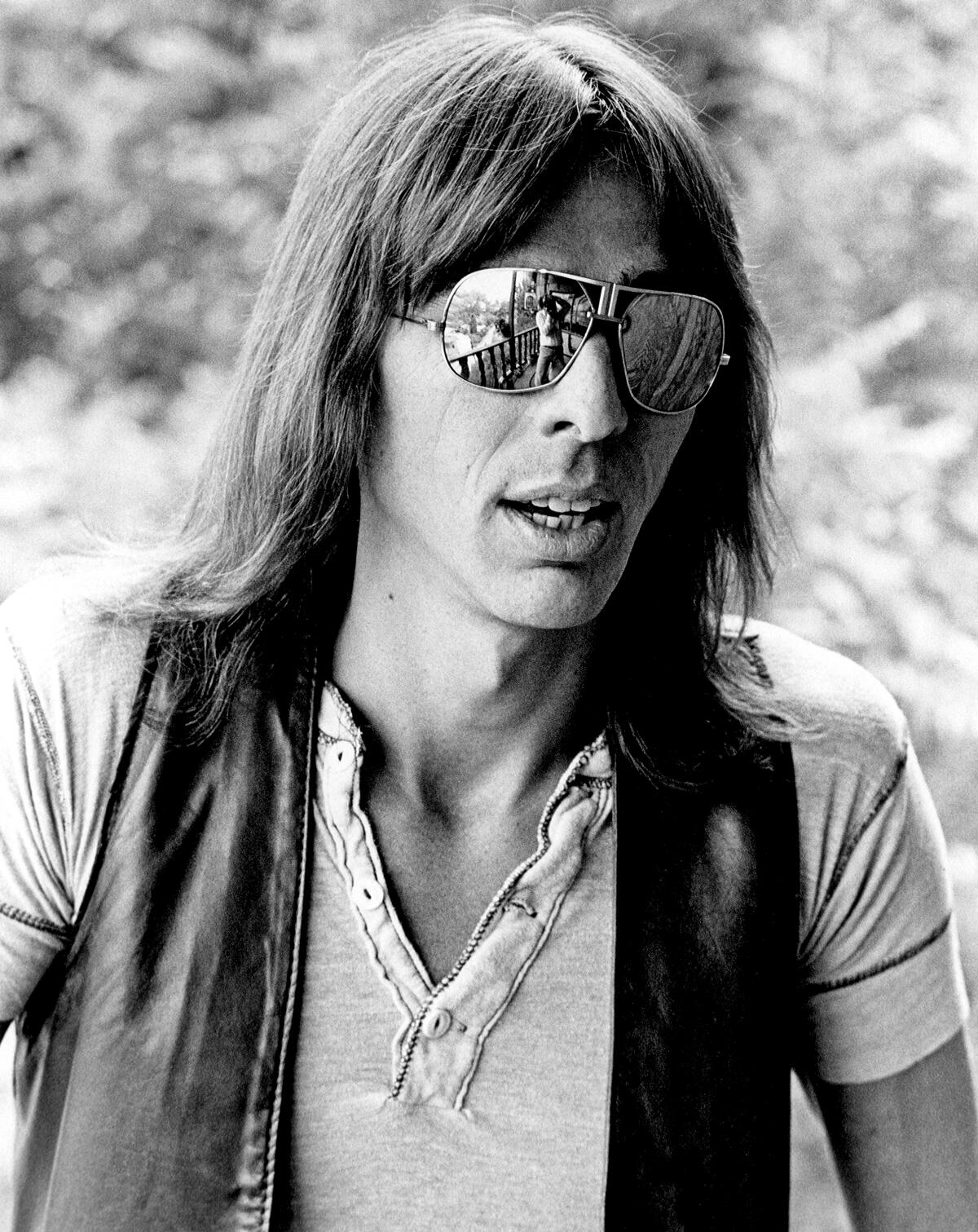Jim Ladd, DJ who was a fixture of L.A. rock radio, dies at 75
Longtime disc jockey Jim Ladd, a central figure in the emergence of FM rock radio in Los Angeles, died Saturday after suffering a heart attack. He was 75.
Ladd’s death was announced Monday by Meg Griffin, an on-air colleague at SiriusXM, where they both worked on the satellite radio service’s rock channels. Ladd has a shift on SiriuxXM’s Deep Tracks channel, which features the album-oriented rock he played over his long career.
Ladd was a favorite personality during the rise of rock radio on the FM band in the 1970s, working at Los Angeles stations KMET and KLOS, where he spent 14 years as its midday host.
Ladd reveled in the stories of the free-wheeling days of free-form rock formats on FM, made possible after the FCC ruled in 1964 that large market AM stations could not duplicate more than 50% of their programming on an FM outlet.
The rule led to new stations that capitalized on a creative surge in rock and pop music that emphasized albums over the hit singles played on the top 40 outlets that proliferated on the AM band.
Ladd’s 1991 memoir “Radio Waves” recounts how air shifts in the early days of those new FM outlets were often conducted through a haze of marijuana smoke.
Ladd later chafed at the increased commercialization of FM radio as it overtook the AM band as the primary source of music programming for radio listeners. He outwardly expressed disdain for management and consultants who favored more restricted playlists.
“I spent 20 years being called on the general manager’s carpet for speaking my beliefs,” Ladd told The Times in a 1991 interview.
Jim Ladd circa 1970.
(Michael Ochs Archives / Getty Images)
Ladd’s devotion to the music earned an invitation from Pink Floyd’s Roger Waters to be a part of his 1987 album “Radio K.A.O.S.” Ladd played himself as a rebel disc jockey on the recording. He also traveled with Waters on the album’s world tour and starred in all three MTV music videos.
Ladd was also the inspiration for rocker Tom Petty’s 2002 song “The Last DJ,” which depicted a disc jockey who stood up to radio station management. (“Well the top brass don’t like him talking so much / And he won’t play what they say to play…”)
Ladd was a well-liked figure among artists, interviewing many of the top acts in the album rock genre over his career. Several posted tributes on social media after learning of his death.
“‘The Last DJ’ has crossed the tracks,” wrote John Densmore, drummer for the Doors. “There wasn’t a more soulful spinner of music. The songs he played were running through his blood, he cared so much for rock n’ roll. Irreplaceable… a very sad day, which can only be handled by carrying his spirit forward.”
This is a developing story.
Longtime disc jockey Jim Ladd, a central figure in the emergence of FM rock radio in Los Angeles, died Saturday after suffering a heart attack. He was 75.
Ladd’s death was announced Monday by Meg Griffin, an on-air colleague at SiriusXM, where they both worked on the satellite radio service’s rock channels. Ladd has a shift on SiriuxXM’s Deep Tracks channel, which features the album-oriented rock he played over his long career.
Ladd was a favorite personality during the rise of rock radio on the FM band in the 1970s, working at Los Angeles stations KMET and KLOS, where he spent 14 years as its midday host.
Ladd reveled in the stories of the free-wheeling days of free-form rock formats on FM, made possible after the FCC ruled in 1964 that large market AM stations could not duplicate more than 50% of their programming on an FM outlet.
The rule led to new stations that capitalized on a creative surge in rock and pop music that emphasized albums over the hit singles played on the top 40 outlets that proliferated on the AM band.
Ladd’s 1991 memoir “Radio Waves” recounts how air shifts in the early days of those new FM outlets were often conducted through a haze of marijuana smoke.
Ladd later chafed at the increased commercialization of FM radio as it overtook the AM band as the primary source of music programming for radio listeners. He outwardly expressed disdain for management and consultants who favored more restricted playlists.
“I spent 20 years being called on the general manager’s carpet for speaking my beliefs,” Ladd told The Times in a 1991 interview.

Jim Ladd circa 1970.
(Michael Ochs Archives / Getty Images)
Ladd’s devotion to the music earned an invitation from Pink Floyd’s Roger Waters to be a part of his 1987 album “Radio K.A.O.S.” Ladd played himself as a rebel disc jockey on the recording. He also traveled with Waters on the album’s world tour and starred in all three MTV music videos.
Ladd was also the inspiration for rocker Tom Petty’s 2002 song “The Last DJ,” which depicted a disc jockey who stood up to radio station management. (“Well the top brass don’t like him talking so much / And he won’t play what they say to play…”)
Ladd was a well-liked figure among artists, interviewing many of the top acts in the album rock genre over his career. Several posted tributes on social media after learning of his death.
“‘The Last DJ’ has crossed the tracks,” wrote John Densmore, drummer for the Doors. “There wasn’t a more soulful spinner of music. The songs he played were running through his blood, he cared so much for rock n’ roll. Irreplaceable… a very sad day, which can only be handled by carrying his spirit forward.”
This is a developing story.
